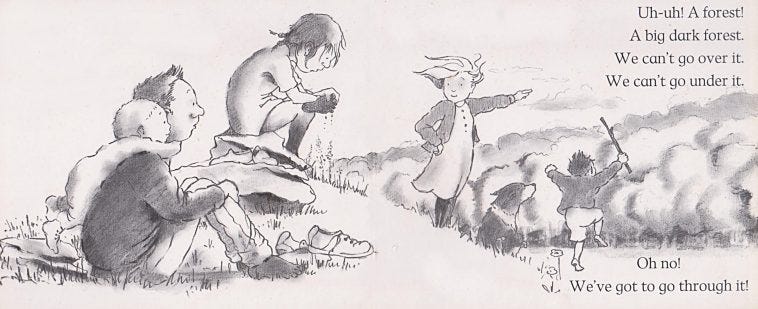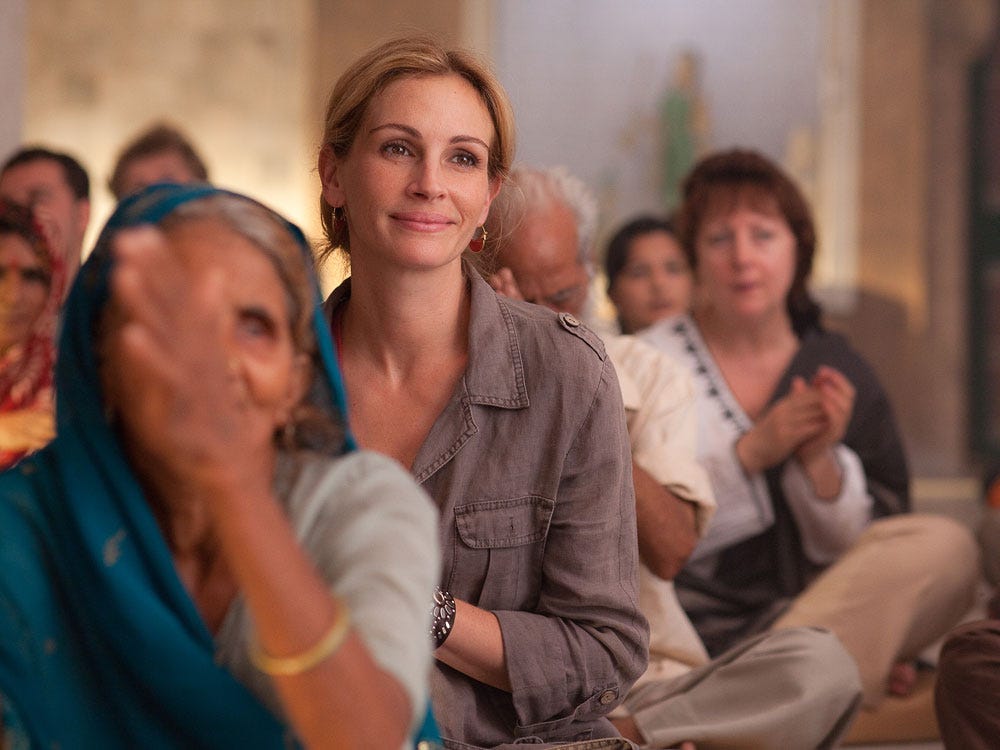I grew up in a household that was ambivalent about faith. I remember my mum once saying, bless her, sometimes I say I don’t believe in God, and then I whisper under my breath, “sorry God” – just in case. We went to church at Christmas. We defined ourselves as “Church of England” but more as a means of identifying our Protestant lineage than our beliefs. My dad, on the other hand, worshiped at the altar of rationalism and so, eventually, I ended up a passionate atheist without having been offered a more tempting alternative.
We didn’t have conversations that said something like, God with a capital G (a.k.a the man in the sky) may not be real, but it’s okay to see the word God as synonymous with a higher power in which you do believe. God can be another word for creativity, infinity, love or oneness. God can also be shorthand for consciousness – consciousness being something to which we each contribute and belong. Something that is both collective and individual.
These are things I had to find out on my own, and find a way to believe in them despite often feeling silly and embarrassed to do so. None of it may be right, but it doesn’t matter because I’m no longer in the business of trying to prove or disprove anyone’s beliefs, including my own.
To be clear, I’m critical of organised religion and I don’t follow any religious doctrines. But I’m also equally critical of unyielding secularism – or "rational atheism" (of the Richard Dawkins variety) that seeks to disprove religion via logic. I think it’s mean-spirited, full of hubris and lacks not only imagination, but also soul. I’m a little embarrassed that I used to be one of those people, laughing at people who believed in something. And laugh I did.
Musician and Writer, Nick Cave, speaks on this topic in a way that I once found kind of nauseating and now see as a reflection of my own inner dialogue on the topic (a trajectory of change that happened in a few short years). Here is his response to a Red Hand Files Question that asks: As an atheist I find other people’s belief in a god both incomprehensible and fascinating. Is there any way you can explain your faith?
“...The more I become willing to open my mind to the unknown, my imagination to the impossible and my heart to the notion of the divine, the more God becomes apparent. I think we get what we are willing to believe, and that our experience of the world extends exactly to the limits of our interest and credence. I am interested in the idea of possibility and uncertainty. Possibility, by its very nature, extends beyond provable facts, and uncertainty propels us forward. I try to meet the world with an open and curious mind, insisting on nothing other than the freedom to look beyond what we think we know…”
I totally get that reading that little three letter word “G-o-d” can absolutely make one’s guts churn. It used to make me want to turn away from a text (and its writer) entirely. I remember reading Eat, Pray, Love in my early 20s and rather than admiring Liz Gilbert’s spiritual journey through India, I literally skipped past it so that I could jump neatly from her eating pasta in Italy to finding love in Bali, without being bothered by her spiritual nonsense. But I realise now that what I skipped past was the beating heart of what transformed her. It wasn’t just a dull chapter in an ashram, it was a bridge between two places. As it turns out, we don’t get to frog leap over the messy awakening to the happy ending. At least, not if that happy ending is going to be truly meaningful.
I also didn’t understand (despite her pains to articulate it in her memoir) that she used God as shorthand for something that refuses to submit itself to the limits of language. It’s slippery and uncomfortable for a reason. It won’t be named because it can’t be named. And its name won’t be heard until the listener opens her ears, anyway. I accept that I can say that “God” can mean infinite things and all some people will hear is “religion” or “fanatic” or “weirdo” or mutter under their breath about Tessa having lost the plot.
With all of that said, I don’t know what I want to call this thing. In Melissa Febos’s memoir, The Dry Season, she similarly tries to give God another, more palatable, name. Instead of a word, she lands on the infinity symbol, which is about the best approximation I’ve come across. So I'm going to borrow ∞ from her, and hope she doesn’t mind. I trust we both know there’s time for me to get it back to her.
Whilst I now understand ∞ has always been there, I had not chosen to see it until 2019, when I terminated a pregnancy. Whilst unequivocally being the right decision for me (wrong boyfriend, wrong path, wrong moment in life), grief lay its head down on my chest and wept for months afterwards. It wasn’t until my therapist said any woman who loses a child by choice or circumstance, has the right to mourn the spirit that has lived and moved through her, that I understood what I was really crying for.
I cried the hardest I ever had because it was the first time I’d faced ∞ and accepted that there was something ineffable I could not explain. It had lived and moved through me, as my therapist had said.
Life continued to unravel for a few years, but alongside that unravelling was a door. An empty space through which I could move. It looked like ∞ , I guess. Something kind of holy and bright that would nudge me in certain directions, when everything else seemed dark. It would make me notice my lungs expanding with air on a particularly crisp winter morning. It would tell me to get out of bed and jump into the ocean at 6am to remind myself that I was alive when I was feeling kind of dead. It was the inexplicable voice telling me to go to Mexico in 2022. It was in the creative act of writing and the devoted act of noticing, in order to be able to write at all.
Moving somewhere 17,000km from home, where you don’t know a single person, requires a kind of faith. It’s a seed deep in the soul that says, the world will catch me. I will catch me. Perhaps it even says, I am the world, and the world is me.
More than three years after that move, I’m writing this from a balcony in Tepoztlán, a pueblo mágico an hour outside of Mexico City. It’s claimed as a magic town in part for the pre-Hispanic pyramid that sits atop Tepozteco Mountain that it said to have mystic properties. People come here regularly to encounter spiritual experiences. Incidentally Tepoztlán is a place I visited several times before I met my husband in search of the same – and it delivered (stories for another time). We now come here together and stay in a house that sits nestled at the foot of the Tepozteco. As I write this, it’s raining and there’s a mist kissing the ridges of the mountain. My baby is sleeping and my husband is reading in an armchair. I believe my heart is this full – at least in part – because I finally bothered to read the pages I used to skip past.
I’m awed by hopelessness that can become hope that can become gratitude. I’m awed by my own capacity for change. By ∞.
---
If you’ve read to the end THANK YOU. It probably means you noticed my months-long absence from this platform. I’ve been busy being a new mum and building a business. I love writing on here because it reminds me I don’t need permission from a publisher or platform to reach people with words, but it’s also exhausting to hold oneself accountable to a publishing schedule.
For these reasons, The Return will continue – but expect its delivery to be sporadic.
Thanks, as always, for being here with me.







This might just be my favourite. My eyes are welling up — you are such a beautiful writer and observer of life. I completely resonate with your aversion to the three-letter G-word and have gone on a similar journey to seeing the nuances in the concept thanks to Nick Cave's writing. Saving this one for a re-read!
This was lovely to read, thank you for sharing your story. I see my own journey mirrored back in many ways.